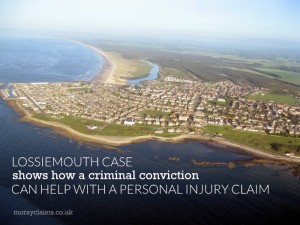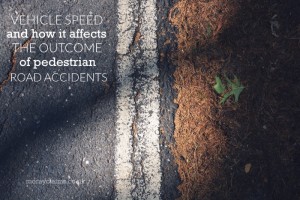A personal injury claim arising from an incident which took place in a Lossiemouth pizza takeaway has provided a good example of how a criminal conviction can be used in a personal injury claim to pave the way for the claim to succeed. This is a procedural decision from the All-Scotland Personal Injury Court in Edinburgh. In this article we will consider three aspects of how a criminal conviction helps with a personal injury claim. Firstly, we will look at the law in relation to the use of criminal convictions in civil proceedings such as personal injury claims. Secondly, we will see how the reference to a criminal conviction in the Lossiemouth case helped the claimant establish that compensation should be payable to him. Finally, we will look at the question of whether it is ever possible for a person who is blamed for an accident/injury to argue their way out of it even if there is a criminal conviction against them. Continue Reading
The Cost Problem with Medical Negligence Claims (and ways to get round it)
If you are above a certain age, you may remember the following scene. Seated at a table in a San Francisco diner, Inspector Harry Callahan’s first bite of a hotdog is interrupted by the ringing of an alarm in the street outside. Muttering an oath, Inspector Callahan wipes his mouth and heads out to investigate. Stepping onto the sidewalk, he draws and cocks his .44 Magnum revolver. Its cylinder has 6 chambers, each holding one bullet. He sees a car draw up outside the bank across the road and, almost simultaneously, a man backs out of the bank, wielding a shotgun which is pointed into the premises. A bank robbery is in its final stages. Callahan warns the man with the shotgun to “halt” but the robber’s response is to spin and fire in Callahan’s general direction. Callahan downs the robber with a single shot. There are two men in the front of the getaway car. A third runs out of the bank and dives headlong into the vehicle through the open rear passenger window. The car Continue Reading
FAQs about After the Event Insurance and Speculative Fee Agreements
Given the way we deal with personal injury claims on a ‘no win- no fee’ (or ‘speculative’) basis at Moray Claims / Grigor & Young, we have to have ‘After the Event’ (‘ATE’) insurance in place. ATE insurance is “after the event” in the sense that your accident was the “event”. If you did not have any ‘Before the Event’ insurance in place (e.g. legal expenses insurance included as part of your house contents insurance) and you do not qualify for legal aid, we need to find another way to insure against the risk that your claim will be unsuccessful and a court makes an award of costs/expenses against you. ATE insurance insures against that risk of adverse costs. In this article, we will consider three questions related to ATE insurance and the speculative fees agreement we get you to sign in conjunction with the ATE insurance. Continue Reading
The Biggest Problem with Medical Negligence Claims
If you consult a solicitor about a possible personal injury claim, you will have a lot of questions. Common examples would be: How much is my claim likely to be worth? How long will it take? But the most important question of all is probably: do I have a claim at all? Lawyers will decide the answer to that on the basis of whether reasonable prospects of success exist. It usually boils down to whether your claim has a better than 50/50 chance of succeeding. So, if the most important question is "Do you think I have a claim?", your solicitor will be keen to reach a view on that issue as quickly as possible. In many situations, your solicitor can reach a provisional view on your prospects of success immediately. They can often give you advice on your chances, just on the initial information you give them. If you’ve been injured in a road traffic accident where another vehicle ran into the back of yours, it was probably their fault. You were on the main road Continue Reading
A Comparison Of Personal Injury Claim Funding Methods: No Win-No Fee vs Legal Aid vs Legal Expenses Insurance
In theory, you could run your Personal Injury Claim on a private fee-paying basis. You would have to pay your solicitor interim fees as the case progressed. You would have to pay for all outlays, including recovery of medical records and payment of expert witness fees. If your case went to Court, you would have to bear a hefty risk. Lose your case and you will not only have to pay the fees and outlays of your own solicitor; you will also be responsible for paying the fees and outlays of the opposing solicitor. Depending upon the complexity of the case and which Court any action is raised in, your legal bill would certainly be thousands of pounds and might be tens of thousands of pounds. Unless you have bottomless financial resources (in much the way that insurance companies do) private fee paying arrangements for personal injury claims are generally reckoned to be “a bad idea”. You need to be able to run your claim in a way which costs a lot less and carries a lot less Continue Reading
If You Are Off Work After An Accident What Rights Do You Have To Receive Pay (or other benefits)?
The Telegraph newspaper reported in January 2014 about a doctor at Barts Hospital in London who had erroneously received a “banding supplement” of £4,000 per month for on-call duties. This went on for more than two-and-a-half years, with the incorrect payments totalling £126,000. Overpayments of wages can occur in a variety of ways, including genuine payroll errors and miscalculation of commission/bonus schemes. According to the report, the £126,000 mistake (which was the most expensive of many) was to be resolved by the doctor paying it back at £500 per month. That would take over 21 years. While overpayments of wages can and do occur (as seen above), where you’ve been injured and are off your work as a result, you’re much more likely to be experiencing an underpayment of wages. The negative financial consequences of being injured in an accident can be significant. What steps can you take to make sure you maximise your income in the aftermath of an accident which leaves you Continue Reading
The Most Popular Personal Injury Articles On The Moray Claims Website In 2016
In 1985, in Camden, London, a graffiti artist known as “King Robbo” spray-painted his name – in yellow, red and black – on a tunnel wall. Photographed in 2006, it can be seen that Robbo’s original had gradually faded to form the background of other graffiti scrawled on top. The well-known, though anonymous, street artist, Banksy, enters the story in 2009. He partially obliterated Robbo’s wall with an image of a workman “wallpapering” over the graffiti in plain grey. Only the “bo” of “Robbo” remained visible. Robbo’s retaliation – on Christmas Day 2009 – was to complete the greywash of his original image. Leaving Banksy’s image of the workman, with his can and paint brush, in place, Robbo added the words “KING ROBBO”, making it appear that the workman had put them there. As the dispute moved into 2010, Banksy heated things up with his reply - adding “FUC” in front of “KING”. With hindsight, it was almost as if Robbo had invited that addition. Robbo seems to have edited it Continue Reading
How often to remind Your Personal Injury Solicitor about Your Case
One of my favourite “job interview” jokes features in various memes on the internet. HR Manager: "What is your greatest weakness?" Interviewee : "Honesty." HR Manager: "I don't think honesty is a weakness." Interviewee : "I don't really give a *!@# what you think." Of course, interviews are intense, stressful experiences where it seems so much can go wrong, including being "too honest". But what if the thing that goes wrong is that you don’t even make it to the interview? What if you make a mistake with the date? It’s not hard to find this sort of "date error" experience reported on the internet. “I’ve just come back from my interview at X, which I went to a week early, and took a day off college for.” “If a candidate turned up a whole week early for an interview, how badly would it affect their chances in your eyes?” “I'm mortified. I must have misread their email. Do I still have a chance of getting the job?” “Well, better a week early than a week Continue Reading
How Nervous Shock Claims depend on whether you are a Primary or Secondary Victim
Primary colours are colours in their own right. They cannot be created through the mixing of other colours. The 3 primary colours are red, yellow and blue. If you mix primary colours together, you get secondary colours. Combining them in pairs gives you green, purple and orange. You can view the primary colours as sitting in the middle and forming the root of the colour system, with all other colours further out, like ripples on a pond spreading out from the centre. Primary colours are the most important and secondary colours are subsidiary. “Primary” and “Secondary” are terms used by lawyers to describe victims in relation to compensation claims for nervous shock. The same sort of explanation for the difference between them works here too. In terms of space and time, primary victims will have played a more significant role in the “events” than secondary victims. They take centre stage whereas a secondary victim is in more of a supporting role, towards the wings. The term Continue Reading
Why Walking on National Speed Limit Roads during the Hours of Darkness is such a Bad Idea
Most of us did this experiment in school Science class. Using a 30cm ruler, one person holds it at the “30” mark and lets it hang down vertically. Their partner (person 2) puts the thumb and first finger of one hand at either side of the “0cm” mark on the ruler. Person 2’s fingers should almost touch the ruler, but not quite. Without warning, person 1 lets go of the ruler. Person 2 tries to stop the ruler’s descent as quickly as they can, by closing their finger and thumb together. You record the level (in cm), just above person 2’s finger, where the ruler was caught. You repeat the test five times and work out the average “catch distance” for the person. A conversion table allows you to translate the distance along the ruler into a reaction time, in milliseconds (thousandths of a second – i.e. one second is a thousand milliseconds). According to one such table, the first centimetre (“0cm – 1cm”) equates to 50 milliseconds. It then increases by 10 milliseconds per Continue Reading
How Speed Affects the Outcome of Pedestrian Road Accident Collisions
Escape velocity is the speed an object must reach to break the bonds of a planet’s gravitational force and get into orbit. To enter orbit around the Earth, for example, a spacecraft needs to be going at a staggering 7 miles per second (25,000 miles per hour). This creates a difficult series of connected problems. The vehicle requires a lot of fuel. Fuel adds weight. More weight means more thrust is required. Greater thrust demands more fuel. And so it goes on … Another situation where speed has a crucial effect on the outcome is in relation to pedestrian road traffic accidents. In this article, we will consider the significance of vehicle speed in pedestrian collisions. Secondly, we will consider the effect of some other factors apart from impact speed. Finally, we will look at some of the implications for measures which can be taken to improve road safety. Frontal impact collision research has considered the effect of speed. Research into road accidents involving Continue Reading
Do you have a compensation claim for a minor injury?
Caffeine is the most widely-consumed psycho-active substance in the world. By ‘psycho-active’, we mean that it has effects on the central nervous system such as improving energy levels, increasing alertness and, in some people, elevating their mood. Many substances are attractive to us partly because they contain caffeine. If you search online using the phrase “tea has more caffeine than coffee”, you will get about 835,000 results. The wording of the search reflects a commonly-held conception: that tea works better than coffee as a caffeine-delivery system. But is that correct? Studies have shown that tea leaves have more caffeine than coffee beans. But that’s not how things finish up in the cup. The main difference between tea and coffee is how much of it gets leeched into the hot water used to make the drink. In fact, you end up with about twice as much caffeine in a cup of coffee as in a cup of tea. It’s all about surface area: coffee beans get ground up, so more of the Continue Reading











